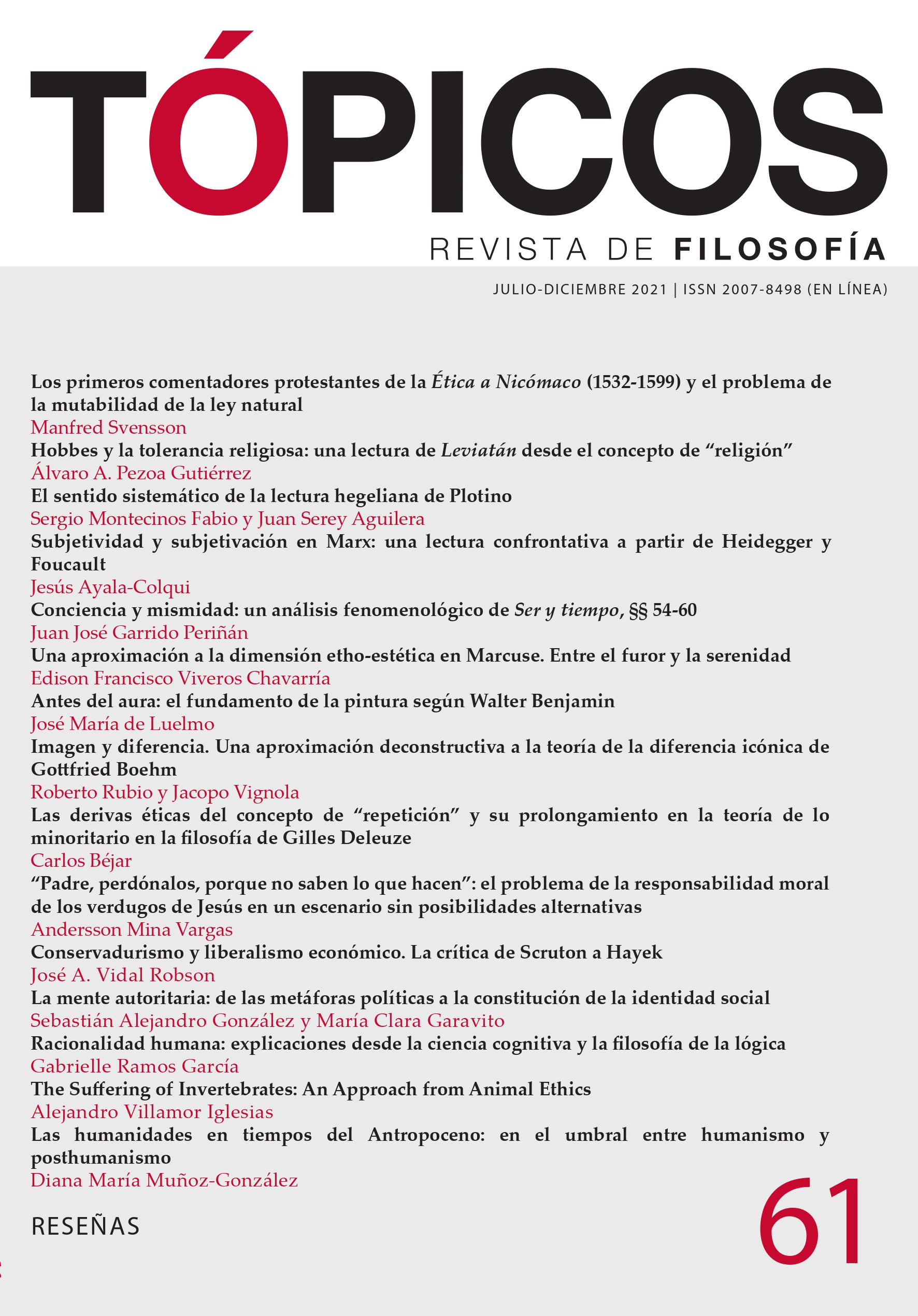Hobbes y la tolerancia religiosa: una lectura de Leviatán desde el concepto de “religión”
Publiée 2021-06-23
Mots-clés
- Hobbes,
- religión,
- tolerancia,
- Leviatán
(c) Copyright Tópicos, Revista de Filosofía 2021

Ce travail est disponible sous licence Creative Commons Attribution - Pas d'Utilisation Commerciale - Pas de Modification 4.0 International.
Comment citer
Résumé
En el artículo se analiza la posibilidad de encontrar una aproximación favorable a la tolerancia religiosa en Leviatán. Para ello, se contraponen dos grupos interpretativos sobre el tema: por un lado, los comentadores más apegados a una lectura “tradicional” de la obra hobbesiana, para quienes hablar de tolerancia religiosa en los textos de Hobbes tiene poco o ningún sentido; por otro, quienes defienden una lectura “revisionista”, llegando incluso a sostener que Hobbes estaba completamente de acuerdo con la tolerancia religiosa. En segundo lugar, se propone una lectura desde el concepto hobbesiano de “religión”, reconstruyéndolo con las caracterizaciones expuestas en Leviatán. Finalmente, se contraponen las corrientes interpretativas con la reconstrucción del concepto de “religión”, determinando en qué sentido se puede hablar de tolerancia religiosa en la obra de Hobbes.
Références
- Aubrey, J. (1898). Thomas Hobbes. En Brief Lives. Vol. 1. (pp. 321-403). A. Clark (ed.). Clarendon Press.
- Bejan, T. (2016). Difference without Disagreement: Rethinking Hobbes on “Independency” and “Toleration”. The Review of Politics, 78(1), 1-25.
- Burchell, D. (1999). The Disciplined Citizen: Thomas Hobbes, Neostoicism and the Critique of Classical Citizenship. Australian Journal of Politics and History, 45(4), 506-524.
- Curley, E. (2007). Hobbes and the Cause of Religious Toleration. En P. Springborg, (ed.), The Cambridge Companion to Hobbes’s Leviathan. (pp. 309-334). Cambridge University Press.
- Dietz, M. (1990). Hobbes’s Subject as Citizen. En M. Dietz (ed.), Thomas Hobbes and Political Theory. (pp. 91-119). University Press of Kansas.
- Farneti, R. (2007). Hobbes on Salvation. En P. Springborg (ed.), The Cambridge Companion to Hobbes’s Leviathan. (pp. 291-308). Cambridge University Press.
- Foisneau, L. (2007). Omnipotence, Necessity and Sovereignty. Hobbes and the Absolute and Ordinary Powers of God and King. En P. Springborg (ed.), The Cambridge Companion to Hobbes’s Leviathan. (pp. 271-290). Cambridge University Press.
- Gauthier, D. (2001). Hobbes: The Laws of Nature. Pacific Philosophical Quarterly, 82(3-4), 258-284.
- Hobbes, T. (2011). Leviatán. O la materia, forma y poder de una república eclesiástica y civil. Fondo de Cultura Económica.
- Jones, M. (2017). “My Highest Priority Was to Absolve the Divine Laws”: The Theory and Politics of Hobbes’s Leviathan in a War of Religion. Political Studies, 65(1), 248-263.
- Lessay, F. (2007). Hobbes’s Covenant Theology and Its Political Implications. En P. Springborg (ed.), The Cambridge Companion to Hobbes’s Leviathan. (pp. 243-270). Cambridge University Press.
- Manent, P. (2002). An Intellectual History of Liberalism. Princeton University Press.
- Martinich, A. P. (2002). The Two Gods of Leviathan. Thomas Hobbes on Religion and Politics. Cambridge University Press.
- Martinich, A. P. (2007). Hobbes. A Biography. Cambridge University Press.
- McDonald, L. M. (2007). The Biblical Canon: Its Origin, Transmission, and Authority. Baker Academic.
- Merriam, C. (1906). Hobbes’s Doctrine of the State of Nature. Proceedings of the American Political Science Association, 3, 151-1157.
- Nadon, C. (2014). The Secular Basis of the Separation of Church and State: Hobbes, Locke, Montesquieu, and Tocqueville. Perspectives on Political Science, 43(1), 21-30.
- Oakeshott, M. (2000). Hobbes on Civil Association. Liberty Fund.
- Patapan, H. (2017). Politics of Immortality: Hobbes on “Humanae and Divine Politiques”. Political Theology, 18(1), 65-75.
- Rogers, G. A. J. (2007). Hobbes and His Contemporaries. En P. Springborg (ed.), The Cambridge Companion to Hobbes’s Leviathan. (pp. 413-440). Cambridge University Press.
- Ryan, A. (2014). Hobbes, Toleration, and the Inner Life. En A. Ryan (ed.), The Making of Modern Liberalism. (pp. 204-219). Princeton University Press.
- Skinner, Q. (1966). The Ideological Context of Hobbes’s Political Thought. The Historical Journal, 9(3), 286-317.
- Skinner, Q. (2007). Hobbes on Persons, Authors and Representatives. En P. Springborg (ed.), The Cambridge Companion to Hobbes’s Leviathan. (pp. 157-180). Cambridge University Press.
- Sorell, T. (2007). Hobbes’s Moral Philosophy. En P. Springborg (ed.), The Cambridge Companion to Hobbes’s Leviathan. (pp. 133-139). Cambridge University Press.
- Springborg, P. (1996). Hobbes on Religion. En T. Sorell (ed.), The Cambridge Companion to Hobbes. (pp. 347-380). Cambridge University Press.
- Stephen, L. (2012). Hobbes. Cambridge University Press.
- Stephen, L. (1989). What is Political Philosophy? And Other Studies. The University of Chicago Press.
- Strauss, L. (2006). La filosofía política de Hobbes. Su fundamento y su génesis. Fondo de Cultura Económica.
- Strauss, L. (2011). Hobbes’s Critique of Religion and Other Writings. The University of Chicago Press.
- Tuck, R. (1990). Hobbes and Locke on Toleration. En M. Dietz (ed.), Thomas Hobbes and Political Theory. (pp. 154-155). University Press of Kansas.
- Whitney, E. A. (1939). Erastianism and Divine Right. Huntington Library Quarterly, 2(4), 373-398.
- Worden, B. (2009). The English Civil Wars. 1640-1660. Phoenix.
- Zaitchik, A. (1982). Hobbes’s Reply to the Fool: The Problem of Consent and Obligation. Political Theory, 10(2), 245-266.





